Posts by Christopher Lochhead
210 How To Build a Business That Makes Money And A Difference with Gero Leson of Dr. Bronner’s
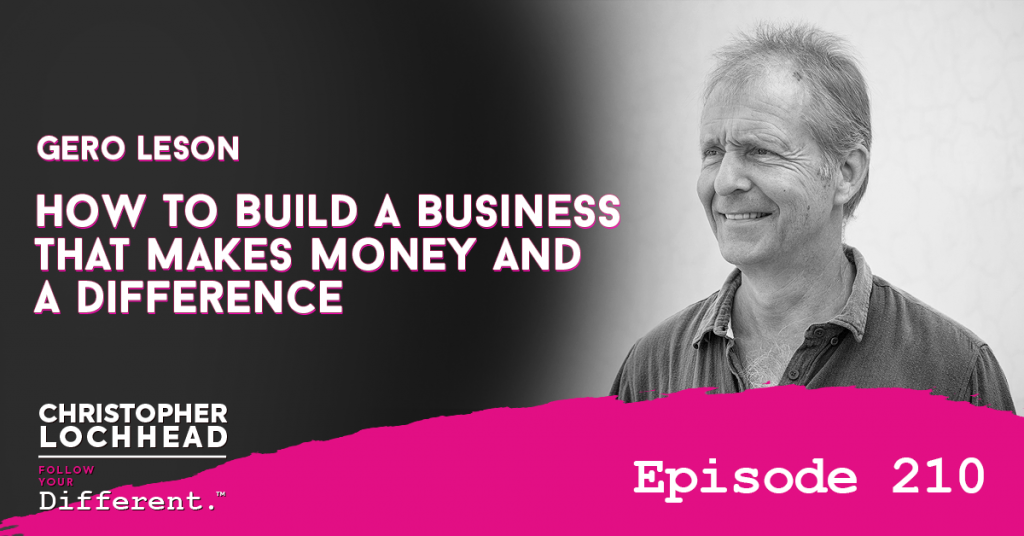
Podcast: Play in new window | Download (Duration: 1:10:12 — 48.2MB) | Embed
Subscribe: Apple Podcasts | Spotify | Pandora | RSS | More
Most leaders want to build a legendary business and be socially and environmentally responsible at the same time. Sadly, many get caught in a false dilemma between doing good in business and doing good in the world. In spite of that, there are companies that strive to do both and continue to prosper to this day.
In this episode of Follow Your Different, Dr. Gero Leson shares how Dr. Bronner’s has become the pioneer in the global movement to establish socially just and environmentally responsible supply chains. So if you care about building a long term, successful business that dominates its niche and makes a giant difference in the world, you’re going to love everything about this conversation.
Having an Impact on the World
If you’re looking for a company that has an impact on the world, look no further than Dr. Bronner’s. They have spent 70 years showing everyone that you don’t have to choose just one to maintain good growth. They back up this claim by ranking as the second highest scoring B Corp in the world.
Dr. Gero Leson attributes this success to having an authentic brand and being consistent about it all these years. He believes that the causes they address speak to the general public, particularly to people who advocate saving the planet.
“There are many other things. Of course, it’s the quality of our product, no doubt. But I think it’s also the messaging and then the action (we take). It’s what we do to have an impact beyond just making soap. I think that package speaks to people, and we have a fantastic team that’s all driven by the same vision.” – Dr. Gero Leson
Standing the Test of Time
Dr. Gero shares his thoughts on how Dr. Bronner’s is still relevant after all these years. Despite having new ideas and products launched, they have stayed true to their desire to have more natural and sustainable products and ingredients in the market.
As for their sustained growth, Dr. Gero explains that they don’t focus on it. He knows it sounds like a cliché, but that mindset helped them explore new ideas that others would find risky.
“This is not about cashing out, getting a few millions in the bank and then retire and just sit on the board of philanthropic organizations. The Bronners’ and most of our executive team just love being able to make decisions and bring about change, and that drives me alive. This is the biggest fun ever. I could retire, but that would be so boring. It’s just so much fun to use your business to bring about change, honestly.” – Dr. Gero Leson
Precision and Creativity
Nowadays, it is normal to have your Executive offices and your production line separate. Yet for the longest time, Dr. Bronner’s has kept it all in one place. This leads to a unique contrast of seeing everything work with exact precision, but in an environment driven by everyone’s creativity and individuality.
“It is really fun to watch normal people respond to this. I sometimes bring in the chiefs of our projects and they’re very normal people. They come there and they say, “Huh, there’s a very interesting, great atmosphere here”. Its a very unique contrast of normality, efficiency, planning and at the same time, you have wildness and independence driving.” – Dr. Gero Leson
To hear more from Dr. Gero Leson and his thoughts on building a business that thrives while making a difference, download and listen to this episode.
Bio:
DR. GERO LESON is Vice President of Special Operations at Dr. Bronner’s, the top-selling brand of natural soaps in North America.
After joining the company in 2005, he helped it transition to sourcing all its major ingredients directly from certified fair trade and organic projects.
Under his leadership, Dr. Bronner’s has become a pioneer in the global movement to establish socially just and environmentally responsible supply chains.
Leson speaks regularly on business, sustainability, fair trade, and regenerative agriculture. He lives in Berkeley, California.
Links
Website: DrBronner.com
Facebook: fb/DrBronner
Instagram: @DrBronner
Twitter: @DrBronner
Get the Book: Honor Thy Label
We hope you enjoyed this episode of Follow Your Different™! Christopher loves hearing from his listeners. Feel free to email him, connect on Facebook, Twitter, Instagram, and subscribe on iTunes!
104 Languaging: How Category Designers Use Language to Change the Future
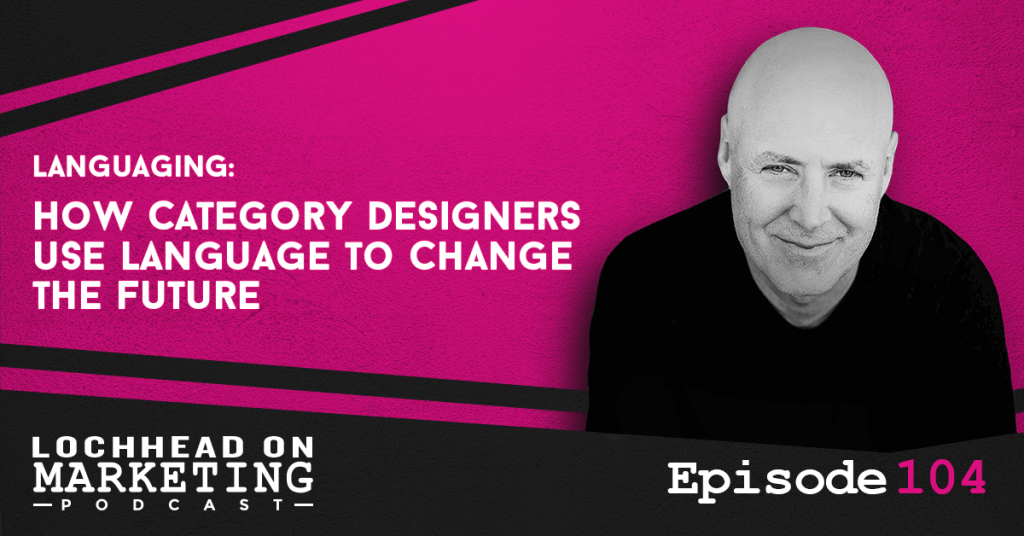
Podcast (lochheadonmarketing): Play in new window | Download (Duration: 7:19 — 5.0MB) | Embed
Subscribe: Apple Podcasts | Spotify | RSS | More
In this episode, Christopher Lochhead talks about language. Specifically, a concept that most entrepreneurs and marketers don’t know much about: Languaging.
Languaging and Creating Context
Languaging is the strategic use of words and language to change and create the future.
As any category designer worth their salt should know, how you frame a category could make or break them. Having a great context for your category is a must if you want to be ahead of the pack.
What better way to add a strategic context than to use statements that will make customers relate to your category. If you do it right, even just one sentence can propel you to the top.
Language and Differentiation
Christopher uses MP3s and Apple iPods to make his point. In the early 2000s, MP3 players had already been in the market for almost half a decade. Yet a lot of people were not using them, and a bigger portion of the population doesn’t even know what it was.
So when Apple launched the iPod in 2001, they had to find a way to get people to switch from their Walkmans to their new product.
To do this, Apple used strategic languaging to distinguish iPod from other MP3 players by calling it a digital music player. That’s differentiation.
To drive it all home, they have this one-sentence slogan that resonates with consumers.
One thousand songs in your pocket.
On his first Apple iPod press release, Steve Jobs made it very, very clear that Apple was absolutely designing a new category with its new product. It wasn’t just another MP3 player. He said:
“With iPod Apple has reinvented a whole new category of digital music player that lets you put your entire music collection in your pocket and listen to it wherever you go. With iPod listening to music will never be the same again.” – Steve Jobs
Apple redesigned the category and ran away with it by putting the technology in a context people could understand.
Frame it and Name it
It is important to note that language we use to describe something changes the thing, the way people see and value the thing.
So what does this mean for category designers? Legendary category designers frame it and name it. Legendary category designers can and do change the future with one sentence.
If you start listening for languaging, which you could think of as the strategic use of words and language to change thinking, you’ll start to notice it more often.
“Remember, a demarcation point in language creates a demarcation point in thinking which creates a demarcation point in perceived value, and action.” – Christopher Lochhead
Bio
Christopher Lochhead is a #1 Apple podcaster and #1 Amazon bestselling co-author of books: Niche Down and Play Bigger.
He has been an advisor to over 50 venture-backed startups; a former three-time Silicon Valley public company CMO and an entrepreneur.
Furthermore, he has been called “one of the best minds in marketing” by The Marketing Journal, a “Human Exclamation Point” by Fast Company, a “quasar” by NBA legend Bill Walton and “off-putting to some” by The Economist.
In addition, he served as a chief marketing officer of software juggernaut Mercury Interactive. Hewlett-Packard acquired the company in 2006, for $4.5 billion.
He also co-founded the marketing consulting firm LOCHHEAD; the founding CMO of Internet consulting firm Scient, and served as head of marketing at the CRM software firm Vantive.
We hope you enjoyed this episode of Lochhead on Marketing™! Christopher loves hearing from his listeners. Feel free to email him, connect on Facebook, Twitter, Instagram, and subscribe on Apple Podcast! You may also subscribe to his newsletter, The Difference, for some amazing content.
209 How To Live A Creative Life w/ Nasri: Grammy-Award Winning Artist, Producer, and Collaborator with John Legend, Robin Thicke, Shakira & more
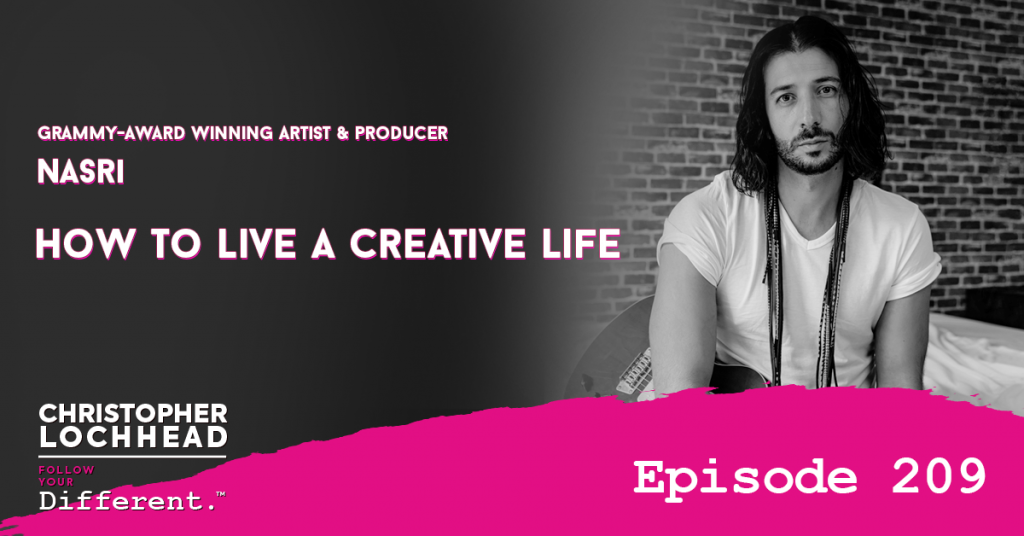
Podcast: Play in new window | Download (Duration: 1:33:08 — 63.9MB) | Embed
Subscribe: Apple Podcasts | Spotify | Pandora | RSS | More
Most people would like to be more creative, and some would like to make a living with their creativity. Though without legendary role models, particularly those who are willing to get real and go deep about their experience, it’s hard to learn what it really takes. In today’s dialogue with Nasri, you’re going to learn about it and a lot more.
In this episode of Follow Your Different, it is all about Nasri. His music has been streamed over 4 billion times to date. He’s a Grammy Award winning songwriter, producer, and singer who’s worked with literally the biggest names in music today. Nasri has won a Grammy Award for his works, including Best Latin Pop Album for his work with Shakira on her record Eldorado in 2017, and Best R&B album for his work on Chris Brown’s F.A.M.E. record.
His band Magic! released three successful chart-topping albums with RCA Records, and he’s probably best known for their international smash hit “Rude”. He also just released a brand-new EP, a solo EP called “Here for You” to much critical acclaim.
This is also Nasri’s first podcast experience, so join him and Christopher as they discuss Grammys, working with great musicians, and how to live a creative life.
On Nasri Winning the Grammys
Christopher starts off with the big one, and asks what it was like winning the Grammys. Nasri shares his thoughts on collaborating with a lot of talented artists and producers in the industry, and the experience of creating Grammy Award-winning songs.
He also adds that nowadays, producing music is different than before. It’s normal to see five or more people being credited in one song, and that’s okay. All of it is necessary to create great music. Though it is understandable why some might be confused when they see multiple names in the credits.
“Now when you make music, everybody has a little piece of everything. It’s kind of confusing when you see four or five names on a credit, or even seven or eight, nine names on a credit of a song. It’s confusing to the audience to like “Seven people wrote this song?” No, seven people didn’t write the song. Two or three people wrote the song, and then it goes through a process of like, “hey, let’s team up with this sound designer”, and they also want a piece of the publishing.” – Nasri
On Creatives Self-Producing
Christopher brings up his experience on publications, and on why he chose to self-publish later on. Nasri agrees with the sentiment, and points out that it’s not a bad idea to work with a company first before trying to publish or produce on your own. At the very least, you’ll get some much-needed experience from them first and commit less mistakes when you are on our own afterwards.
“I think the beginning stages, if you look at why you may need a publisher, it has made me learn a couple things, you know. To see kind of what the scope of marketing for this medium is, and that’s what I went through. In the band Magic!, we were signed to RCA Records, and I was like, “Okay, cool.” When I went now to make my solo project, I felt like I had a pretty good grip of how to market something.” – Nasri
He’s also glad that he got into self-production. He talks about how he’s not on other people’s clock but his own, and he take his time and perfect his craft.
“I’m in no rush. I own the master. I have nobody telling me in some sort of meeting that is not moving fast enough. That’s (part of) what I didn’t like.” – Nasri
Nasri’s New EP
Speaking of producing something, Nasri recently released his new EP, “Here For You”. Nasri talks about how it came to be, and how much fun it was to create. He also got into the finer details and how happy he is with its reception.
“So all of a sudden, this whole thing just came together through us just being passionate about it. And some of the stories that in all the years of him making music, this is one of the first times that his wife has actually listened to the music on repeat, you know? Because generally, a lot of the stuff we make our wives are like, yeah, another pop song. They’ll listen to it once or twice and be like, “okay, cool”. But now, we went in and made some real music.” – Nasri
To hear more about Nasri and his thoughts on creating great music on his first-ever podcast, download and listen to this episode.
Bio
Nasri
With over 4 billion streams to his name, Grammy-winning artist/producer Nasri Atweh has solidified himself as a certified hitmaker.
Lending his songwriting talents for artists including Justin Bieber, Halsey, Robin Thicke, Usher, John Legend, Skip Marley, H.E.R., Chloe x Halle and many more, Nasri has proven his ability to bring the best out of the artists with whom he works and elevate their art to a whole new level.
Nasri was born and raised in Toronto, Canada, and began singing at age 6. In 2002, Nasri won the John Lennon songwriting contest with a song he wrote with one of his closest collaborators, Adam Messinger.
Following this, Nasri and Adam then formed the production duo called “The Messengers.”
Together, they helped drive the reunion of New Kids on the Block and wrote hits for Christina Aguilera, David Guetta, Cody Simpson, Jason Derulo, and many more. Nasri and Adam were nominated for two Grammys in 2011 for their work on Justin Bieber’s My World 2.0andChris Brown’s Graffiti and the duo won the Grammy for Best R&B Album in 2012 for their work on Chris Brown’s F.A.M.E.
Additionally, Nasri won the Grammy award for Best Latin Pop Album for his work on Shakira’s El Dorado in 2017.
In 2013, Nasri took a step out from behind the curtain as the front man of MAGIC!
The band released their highly successful debut song “Rude” which topped the charts in the United States and the United Kingdom. MAGIC! has gone on to release three albums with RCA Records: Don’t Kill the Magic (2013), Primary Colours (2016), and Expectations (2018). Today, Nasri continues to work with music’s top talents. In 2020, albums he worked on received multiple Grammy Awards including Best Pop Vocal Album (Justin Bieber – Changes), Best R&B Song (Skip Marley ft. H.E.R. – “Slow Down”), Best Reggae Album (Skip Marley – Higher Ground), Best R&B Album (John Legend – Bigger Love) and Best Progressive R&B Album (Chloe x Halle – Ungodly Hour).
Links
Follow Nasri today!
Twitter: @NasriWorld
Instagram: @NasriAtweh
YouTube: @NasriAtweh
Learn more about Nasri!
We hope you enjoyed this episode of Follow Your Different™! Christopher loves hearing from his listeners. Feel free to email him, connect on Facebook, Twitter, Instagram, and subscribe on iTunes!
103 Digital Products, NFTs, Clubhouse, Oh My with Jason DeFillippo
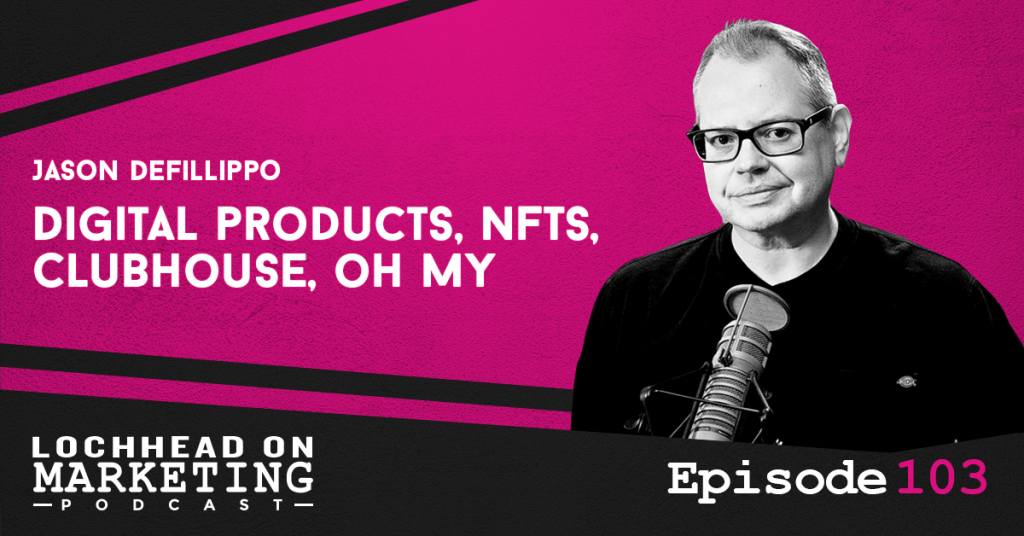
Podcast (lochheadonmarketing): Play in new window | Download (Duration: 40:01 — 27.5MB) | Embed
Subscribe: Apple Podcasts | Spotify | RSS | More
In the last episode, Christopher popped the hood on digital products, more specifically about NFTs or Non-Fungible Tokens. As you may know, a 10-second GIF recently just sold for $6.6M. This was due to NFTs.
Now, there are other companies and celebrities jumping in on it. Jack Dorsey, the founder of Twitter, is now auctioning off the first tweet for $2.5M, as of this taping. Rock band Kings of Leon is set to be the first band releasing a record as an NFT. These cyber collectibles are taking off and having a profound impact.
Yet our producer, Jason DeFillippo, has some questions. Jason is the greatest of all time in podcast producers, and he’s worked with Tim Ferriss, Jordan Harbinger and many others. He also hosts one of the greatest podcasts ever, Grumpy Old Geeks. He also has a lot of experience in the art world, as he worked with his dad for a long time. Jason has an opinion about NFTs, and he and Christopher talk about that, Clubhouse, and a bunch of other fun things.
Digital Products have been Here Forever
Jason DeFillippo comments about Christopher’s statement about digital products and NFTs being a category-defining moment. For someone who has played online games like Jason, digital products have been around since the early 2000s. People have been buying and selling digital items to use in-game, and there’s even a whole industry built on farming in-game currency for it.
As for NFTs, Jason doesn’t see the purpose to all of it other than being a rich man’s game. It’s like buying a pet rock, but at least with the pet rock you get a rock for your troubles.
“We had this kind of shit back in the day, 10 years ago, and we would buy digital items, we would buy digital clothes, we would mine gold. It was Bitcoin before there was Bitcoin, and it was just a bunch of nerds sitting around killing orcs. There was a purpose to the NF T’s back then, because it was all in-game. Now we have all of the crap that you know was the digital stuff, but no game to play. Today’s NF T is one of those things that to somebody like myself with a highly tuned bullshit detector made my head explode.” – Jason DeFilliippo
On Digital Natives Buying Digital Products
Christopher asks if it makes sense that native digital people are buying more digital products than physical ones. Jason thinks it is, but it again depends on the purpose of the purchase. It depends on the context of why they bought the item, either to make their digital home look better, or have the best weapon for a game they’re playing.
Again, NFTs miss the mark in this regard. Jason thinks that this $6.6M purchase just got overhyped because people are looking for excitement. That, and because it is attached to blockchain. So people who are looking for the next big thing are suddenly scrambling to see if NFTs fit the bill. According to Jason, it doesn’t.
“That’s the problem with it. It doesn’t make any sense. I think it’s a fad. This has all of the hallmarks of us being stuck inside for far too long. We need something to excite us. It’s on the blockchain. You know, if they could just sprinkle in some AI, we would have like a BS trifecta here.” – Jason DeFillippo
Why is Clubhouse a Thing?
Christopher and Jason discuss the app Clubhouse, and why it’s even a thing. For one thing, the features it has is already present in various other apps, like Discord and other online voice chat software. What makes it weirder is that it is trying to bring back the feeling of radio, something that podcasts have killed a long time ago.
The appeal to some comes from the fact that it is invite-only. Though that in itself is not a unique feature, as Jason points out. There are a lot of apps that can just integrate such features into their own well-established ones. It’s why Jason thinks that Clubhouse will come to a quick demise soon.
“My buddy John Wall of Marketing Over Coffee was quick to point out that as a creator, there’s no value here. First of all, I got to be Live. So it’s just like radio. Instead of podcasting, where we do it now and release it later, you got to be live. So as a creator, you’re fucked on that. So you have to be there, you have to do a radio show, and as a user you have to be there for that specific time.” – Christopher Lochhead
“I’ve been invited to like two dozen clubhouse chats. I’m like, it’s 3:30 in the afternoon on a Tuesday, I have a job. They want to do it at like 10:30 at night, I’m like, I gotta sleep. It doesn’t make any sense.
The other side is there’s no discoverability, finding a room is terribly hard, and the audio quality sucks. They say you’re not allowed to record it, but everybody records it. And you know, there’s, there’s so many things wrong with it, it’s hard to begin to figure out where the most wrong thing is wrong with it” – Jason DeFillippo
To hear more about Christopher and Jason’s thoughts on digital products, NFTs, and Clubhouse, download and listen to this episode.
Bio
Jason DeFillippo
Jason has been building websites since the early days in 1994 for clients that range from small businesses to million-dollar websites for blockbuster films to his own start-ups.
In 1995 a new media company in Santa Monica moved him out to Los Angeles to build the first website for Epson America.
Since then, Jason has launched over 250 websites for major corporations like Paramount Pictures, Sony, Warner Brothers, and Disney.
He also created the two-time SXSW Weblog Award-winning Blogrolling.com as well as co-founded the global blog network Metroblogging.
He has worked at several startups in San Francisco including Technorati.com and 8020 Media, the publishers of JPGMagazine.com and statistical aggregator Metricly.com.
Currently, Jason is a full-time podcast producer and editor.
Links
We hope you enjoyed this episode of Lochhead on Marketing™! Christopher loves hearing from his listeners. Feel free to email him, connect on Facebook, Twitter, Instagram, and subscribe on iTunes! You may also subscribe to his newsletter, The Difference, for some amazing content.
208 The Power of Ethics with Bestselling Author Dr. Susan Liautaud
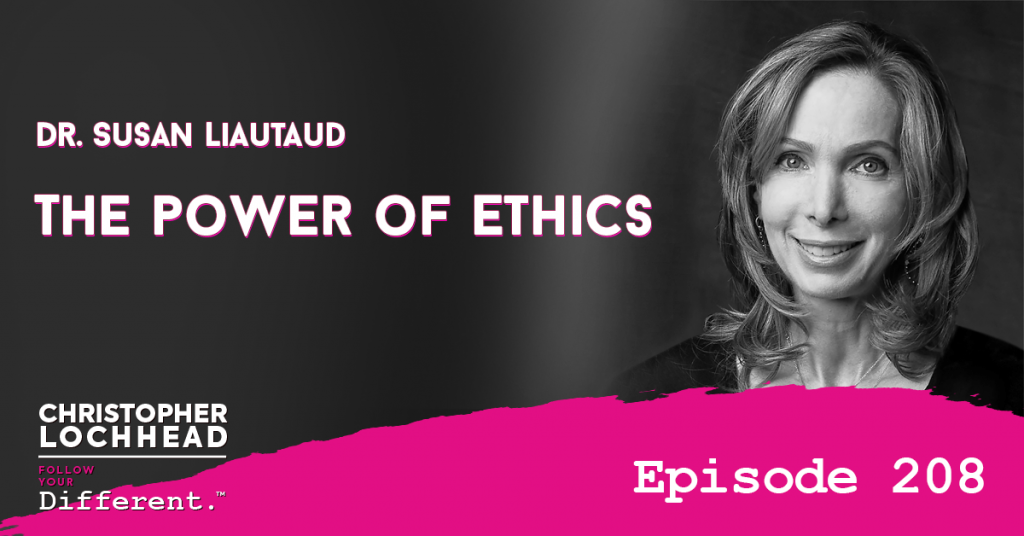
Podcast: Play in new window | Download (Duration: 1:33:05 — 63.9MB) | Embed
Subscribe: Apple Podcasts | Spotify | Pandora | RSS | More
Nowadays, people live at a time when discerning what’s right and wrong is getting more complex. As your choices can have profound, long term implications, it’s best to know where your moral compass lies.
In this episode of Follow Your Different, Dr. Susan Liautaud talks about Ethics and why it is more than just common sense. She explains why it matters more today, and how to apply an Ethics lens to critical areas of society. This is a fascinating conversation that will matter to anyone who cares about making the world a different place.
Dr. Susan Liautaud is the author of the new bestseller, The Power of Ethics: How to Make Good Choices in a Complicated World. She is an Ethics Advisor to major corporations and institutions, and also teaches Ethics at Stanford. She serves as Chair of the London School of Economics and Political Science Council.
Why Ethics is Not Common Sense
It used to be that people grew up on stories that gave examples of what’s right and wrong. Everything seemed black and white, and the lines in the sand were clear. In today’s world, where information is but a touch of a screen away, these lines have seemingly been blurred.
Dr. Susan Liautaud uses media platforms like Facebook or Twitter as examples for this. On one hand, it serves as a tool to connect people together and have lively conversations. On the other hand, there are some that use it to bully people and spread misinformation.
“In today’s world, you know, good and bad are all mixed. We are in this gray zone and things that can be used for the good like social media. Yet they can also be used for harm, like bullying on social media or spread of disinformation. So I think largely because the world has just gotten so complicated and technology and all the forces driving it aren’t really common sense for a lot of people.” – Dr. Susan Liautaud
The World is Changing so Fast
Christopher shares that for him, changing your opinion on something is not a bad thing. It means that you are open to new ideas and correcting your own.
“If you haven’t changed your mind lately, how do you know you have one?” – Christopher Lochhead
Dr. Susan agrees with this sentiment, and describes that Ethics can be the same way. The things we find ethical or otherwise can be flipped due to recent events or newly-available information. For her, it’s better to be in-the-know rather than to always stick with the old ways.
“I think one of the things about ethics that’s different today is that the world is changing so fast. The complexity I referred to earlier is evolving so quickly that we need to be monitoring, instead of holding our nose and leaping into a decision and being sure that we’re absolutely right. So I don’t call it flip flopping. I call it staying grounded in reality.” – Dr. Susan Liautaud
Finding Non-Binary Solutions
As more people get access to information and the lines between black and white get even more blurred, people’s definition of Ethics changes even further. For Dr. Susan, this is not a bad thing. Her main concern lies with people still looking for binary solutions to solve ethical problems.
Dr. Susan explains how people can get stuck behind a yes or no mindset for different situations, which limits their thinking to binary solutions. She elaborates further by using Christopher’s foil board example:
“What I would say is, can’t we find a solution that is non-binary, other than you can’t foil board on a public beach. Maybe you can foil board at certain times of day, in a place where there are only foil boarders who are willing to put themselves at that risk. We get ourselves into this Yes, No, black, white, one side of the wall or the other binary thinking, and we never get to seizing opportunity and mitigating risk.” – Dr. Susan Liautaud
To know more about Dr. Susan Liautaud and how Ethics is not common sense in some companies, download and listen to this episode.
Bio
Dr. Susan Liautaud teaches cutting-edge ethics at Stanford University and serves as Chair of the Council (trustees) at the London School of Economics and Political Science.
She advises corporations, NGOs, and governmental bodies and their leaders on internationally complex ethics matters and is the Founder of the Ethics Incubator.
Links
Follow Dr. Susan Liautaud here!
Linkedin: in/SusanLiautaudJDPHD
Twitter: @SusanLiautaud
Stanford profile: Dr. Susan Liautaud
Find out more about Dr. Susan Liautaud in these articles:
We hope you enjoyed this episode of Follow Your Different™! Christopher loves hearing from his listeners. Feel free to email him, connect on Facebook, Twitter, Instagram, and subscribe on iTunes!
102 The Future Just Changed and Most People Missed It
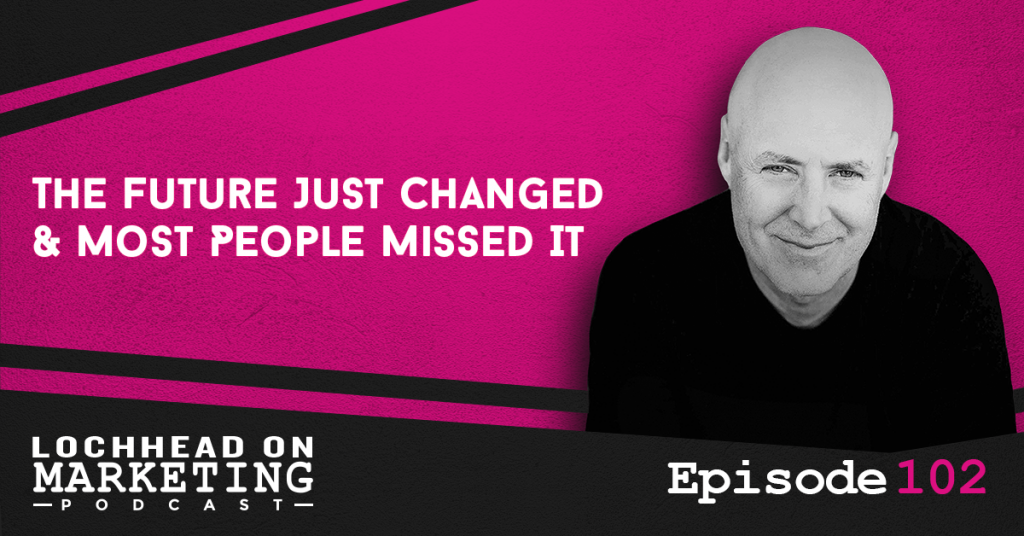
Podcast (lochheadonmarketing): Play in new window | Download (Duration: 13:36 — 9.3MB) | Embed
Subscribe: Apple Podcasts | Spotify | RSS | More
In October 2020, a 10-second video clip sold for $67,000. Just recently, that same 10-second video sold for $6.6 Million. This selling of a piece of digital art changed the future… and most people didn’t even notice.
This new category design could have profound implications in the art world of art – and soon, everywhere else! So in this episode, Christopher Lochhead talks about digital-exclusive products, how it can be the next mega-category, and how it can affect your business and brand in the future.
Prioritizing Your “Real Life”
As the age of digitization continues to evolve, people find themselves becoming more invested in their digital life. If you’re between thirty or thirty-five, you’re probably a digital native. Everyone below that are definitely digital natives: those who spend most of their time online and connected digitally.
The big AHA moment here for Christopher is that digital natives prioritize their digital life more than their physical life. It is almost as if their digital life is their “real life”, therefore it has more value for them.
“If you’re a digital native, the AHA here is your digital life is more important than your physical life. If you’re a digital native, you’re having the opposite experience that someone like me. Someone who believes my primary experience in life is a physical one, but it’s supplemented with a rich digital life. But if you’re my buddies and their kids, your real life is the digital life and the ocean and the sunset are an interruption to your real life. That was a profound moment for me. I understood at that moment the difference between digital natives and non-digital natives were 180 degrees different.” – Christopher Lochhead
Digital-Exclusive Products as a Mega Category
Digital products have been around for quite some time. There are games that sell digital clothes to make your avatar look good or play better. However, this 10-second digital media clip that sold for $6.6 million dollars in an NFTE auction classifies as category design.
This new art category design is changing the definition of the category of what it means to be an artist and what a piece of art means in the digital age. Art is now a new digital category; it’s not only physical anymore. Who’s to say that other products won’t follow suit in the future?
“In the past, people would pay six point six million dollars for a painting, not a bunch of zeros and ones. This is a way bigger development than somebody paying a few dollars to buy a digital tractor or a rifle in a video game. Someone paid over six fucking million dollars for some zeros and ones, and those zeros and ones are artificially being restricted. In this case, they paid that money so they’d be the only people in the world to have those zeros and ones.” – Christopher Lochhead
All of these circle back to digital natives and how they prioritize things. It is why you see people being reluctant to buy a car but willingly fork over money for a digital vehicle in an app. They want to live out their best lives in their perceived “real life”.
“If you’re a digital native, your digital life by default is more important and more valuable to you than your physical life. If that’s true, it stands to reason that digital native’s want to buy shit for their digital native selves and they’ll buy things in their digital world that they wouldn’t buy in their physical world.” – Christopher Lochhead
Should You Ride the Digital Wave?
So what does that mean for companies and their corresponding categories and brands? Well, if you want to stay ahead of the pack, you need to step back and think about the increasing role of people’s digital lives in the market. Especially in the new marketing landscape that COVID has wrought, where people live in a digital workplace in a way that they didn’t before.
“I think we have to ask ourselves: is there an opportunity and or threat for our categories, brands and businesses in a world where people’s digital life is their primary experience and their physical life is their secondary experience?” – Christopher Lochhead
To know more on digital-exclusive products as a new mega-category, download and listen to this episode.
Bio
Christopher Lochhead is a #1 Apple podcaster and #1 Amazon bestselling co-author of books: Niche Down and Play Bigger.
He has been an advisor to over 50 venture-backed startups; a former three-time Silicon Valley public company CMO and an entrepreneur.
Furthermore, he has been called “one of the best minds in marketing” by The Marketing Journal, a “Human Exclamation Point” by Fast Company, a “quasar” by NBA legend Bill Walton and “off-putting to some” by The Economist.
In addition, he served as a chief marketing officer of software juggernaut Mercury Interactive. Hewlett-Packard acquired the company in 2006, for $4.5 billion.
He also co-founded the marketing consulting firm LOCHHEAD; the founding CMO of Internet consulting firm Scient, and served as head of marketing at the CRM software firm Vantive.
We hope you enjoyed this episode of Lochhead on Marketing™! Christopher loves hearing from his listeners. Feel free to email him, connect on Facebook, Twitter, Instagram, and subscribe on Apple Podcast! You may also subscribe to his newsletter, The Difference, for some amazing content.
101 Category Design Scorecard
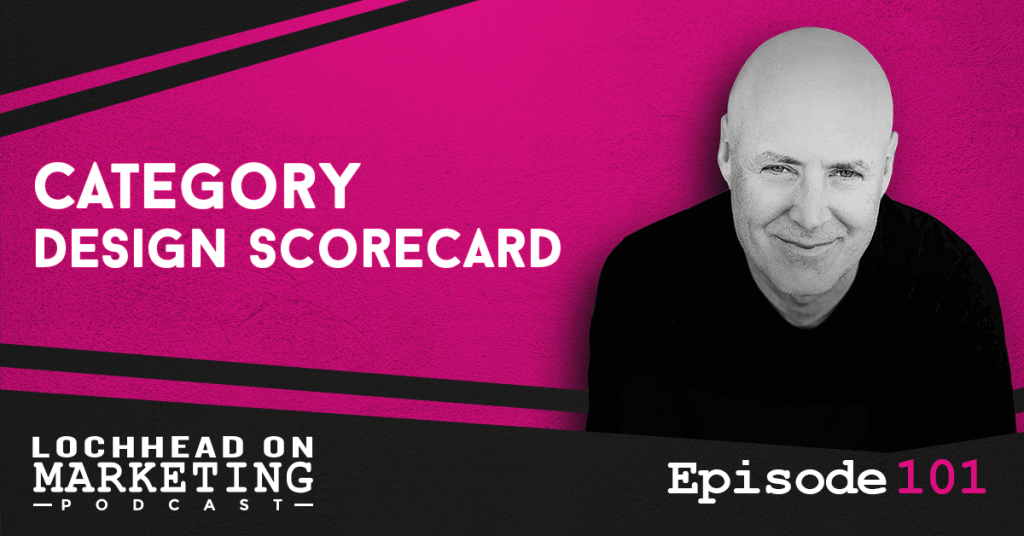
Podcast (lochheadonmarketing): Play in new window | Download (Duration: 20:28 — 14.0MB) | Embed
Subscribe: Apple Podcasts | Spotify | RSS | More
This episode talks about the Category Design Scorecard and how you can use it to spot a Category Designer. It also breaks down how you can evaluate a company’s ability to create a new category or redesign an existing one.
Christopher and his Category co-pirates, Eddie Yoon and Nicholas Cole, just unveiled this new Category Design Scorecard. It is based on a tremendous amount of primary research, and they can’t wait to share it with all of you.
How the Category Design Scorecard Came to be
The episode starts off by explaining why they created the Category Design Scorecard. Christopher, Eddie, and Nicholas wanted something that can distinguish a company that is a category designer or creator from a high growth company fighting tooth and nail for market share in their existing category.
We analyzed Fortune magazine’s 100 fastest-growing companies list for over a decade. Were there certain things that companies are trying to design and dominate a new category? They were easily distinguishable from other high growth companies due to certain things they said. So we picked the Fortune 100 fastest growers list over a decade. What we discovered as we began to dig into the data are five key indicators. Those five key indicators distinguished category designers from other successful companies. – Christopher Lochhead
The Five Components of the Category Design Scorecard
Christopher then enumerates the five components of their new Category Design Scorecard, and they are as follows:
1. Category POV
Does the company have a clear “Point of View” of their category?
Are they able to frame a powerful problem, articulate a compelling vision, and most importantly, communicate the core compromises, trade-offs, and problems inherent to the way the category is today, but in such a way that the consumer/customer will be open to a new and different approach.
Category designers have a very specific way of doing it; which is they are going after something that they see as a noble cause, a noble purpose, or a giant problem worth solving. It’s either a problem that we didn’t know that we had, that they’re educating us about, or it’s an existing problem that they meaningfully reimagine it in a new context. – Christopher Lochhead
2. Future Category Reimagined and Without Compromise
Does the company cast a compelling future — free of any fundamental problems, compromises, and trade-offs inherent to the category as it is today?
We’ve learned a lot from our friend Joe Pine, who is one of the co-authors of The Experience Economy. One of the things that he teaches us is that companies that are successful in doing this transform their customers, transform their partners, and as a result of bringing new things to the world, they generate a tremendous amount of abundance. So the second criteria is, are they articulating a future category in a reimagined way without compromise? If they do, can the future category break new grounds and get us an exponential kind of future? – Christopher Lochhead
3. Radically Different Offer + Business Model
How does this new category get delivered to the customer? Is it both through a breakthrough product/service/offer, but also through a breakthrough business model?
How does product innovation and business model innovation come together in a way where 1 + 1 = 11?
There has to be something radically different about either the product offer, the business model, or both. – Christopher Lochhead
4. The Data Flywheel
Does the company generate data about customer/consumer with demand/preferences that creates a unique opportunity and advantage to anticipate the future of consumer demand and any category shifts?
Will this Data Flywheel provide insight into not only how to improve company offerings, but predict where demand for this new category will unfold next?
One of the big insights in Superconsumers is a relatively small percentage of the most enthusiastic consumers are customers that drive any category change. So another thing to think about is, does the flywheel produce insights into Superconsumers, and not just everyday customers? This allows a company to be very predictive about going forward. – Christopher Lochhead
5. Depth & Degree of Customer Outcomes
Does the company generate satisfied customers/consumers?
Are customers so happy and satisfied they evangelize the product/service to others? Better yet, do customers want to tell their own stories where the customer’s life is truly different after engaging with the company?
The degree to which a customer has a massive outcome, particularly an outcome that drives massive word of mouth. When your outcome drives word of mouth, and you have a compelling category point of view, you’re actually telling your customers what to say as they go share it with their friends.– Christopher Lochhead
To know more on how the 100 fastest-growing companies fare in the Category Design Scorecard, download this episode.
Bio
Christopher Lochhead is a #1 Apple podcaster and #1 Amazon bestselling co-author of books: Niche Down and Play Bigger.
He has been an advisor to over 50 venture-backed startups; a former three-time Silicon Valley public company CMO and an entrepreneur.
Furthermore, he has been called “one of the best minds in marketing” by The Marketing Journal, a “Human Exclamation Point” by Fast Company, a “quasar” by NBA legend Bill Walton and “off-putting to some” by The Economist.
In addition, he served as a chief marketing officer of software juggernaut Mercury Interactive. Hewlett-Packard acquired the company in 2006, for $4.5 billion.
He also co-founded the marketing consulting firm LOCHHEAD; the founding CMO of Internet consulting firm Scient, and served as head of marketing at the CRM software firm Vantive.
We hope you enjoyed this episode of Lochhead on Marketing™! Christopher loves hearing from his listeners. Feel free to email him, connect on Facebook, Twitter, Instagram, and subscribe on Apple Podcast! You may also subscribe to his newsletter, The Difference, for some amazing content.
206 Wild Rituals: Dr. Caitlin O’Connell of Harvard on Lessons Animals Teach Us About Connection, Community, and Ourselves
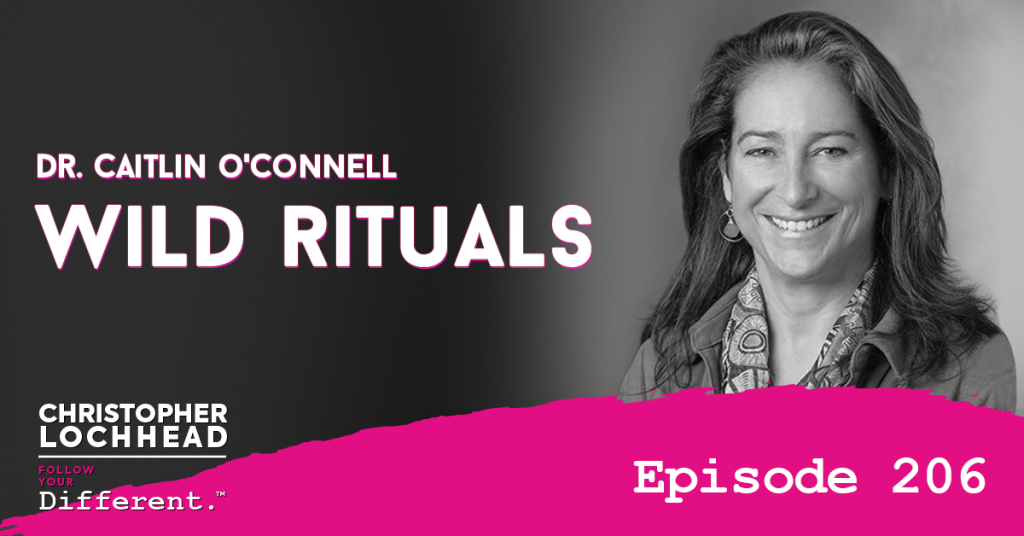
Podcast: Play in new window | Download (Duration: 1:12:25 — 49.7MB) | Embed
Subscribe: Apple Podcasts | Spotify | Pandora | RSS | More
In today’s episode of Follow Your Different, we are joined by Behavioral Ecologist and world-renowned Elephant Scientist, Dr. Caitlin O’Connell. She spent more than 30 years studying animals in their natural habitats. Dr. Caitlin has also taught at places like Stanford and Harvard.
She’s got a brand-new book out called Wild Rituals, where she explores 10 lessons animals can teach us about connection, community, and our own humanity. Her book comes out at a time in history when the human race is dealing with some pretty deep existential questions. Dr. O’Connell is here to help us deepen our understanding of ourselves by teaching us all about these legendary animals.
Taking Social Rituals for Granted
As the pandemic continues to keep everyone socially distant, people have started noticing social rituals and activities that we used to take for granted. Dr. Caitlin talks about the rituals in wild animal societies and how intense each social interaction was, even for something as simple as a greeting.
She further explains that in our current isolation, people have realized the importance of these rituals in our lives, no matter how basic it may have seemed.
“The reason I was inspired to write about rituals in wild animal societies was really just to remind us of how important ritual is in our own lives, and how similar our rituals are to other animals.” – Dr. Caitlin O’Connell
Different, But the Same
Dr. Caitlin discusses how we as a species have evolved, and how tools like language have accelerated our growth. Yet it is important to remember that everyone came from the same humble beginnings, but took different paths.
She reminds everyone we all evolved this need for ritual for the same purpose, despite the differences we display them.
“It’s easy for people to do that because we are the only species that evolved language. Then by that language, suddenly we just accelerated away from the branch on our evolutionary tree. But the thing to remember is that we all came from the same humble beginnings, whether or not we moved in another direction.” – Dr. Caitlin O’Connell
The Importance of Rituals
Dr. Caitlin and Christopher dive into the importance of social rituals, and why we cling to them almost instinctively. Dr. Caitlin shares that inclusion in such rituals makes us feel comfortable and connected.
“Well, rituals are very calming, they’re very soothing, they comfort us and, and make us feel connected. They, especially group rituals, when you’re doing something as a group, let’s say in a marching band or synchronized swimming, or singing with your friends to cheer your team on. They make you feel included and more bonded to the people that you’re with.” – Dr. Caitlin O’Connell
She also explains that as the population grew and society became more diverse, some social rituals have evolved to help identify each other from different groups. Yet as all of these group rituals help people feel bonded to the group, rituals can also lead down a dark path.
To know more about Dr. Caitlin O’Connell, as well as the dark path and how we can avoid it as social animals, download and listen to this episode.
Bio:
Dr. Caitlin O’Connell has been called a modern renaissance creative.
She is currently on the faculty at the Eaton Peabody Lab at Harvard Medical School studying elephant low-frequency hearing while also overseeing a non-profit foundation, (Utopia Scientific) promoting the importance of science and conservation.
Dr. Caitlin is an award-winning author and photographer and has been studying elephants in the wild for the last thirty years, having written dozens of scientific papers and numerous feature magazine articles and two memoirs about her experiences.
She taught creative science writing for Stanford and The New York Times and co-developed the award-winning Smithsonian documentary, Elephant King.
Dr. Caitlin is currently developing a new elephant docu-drama, Elephant Crown, and working on several feature movie and television scripts aimed at getting real science into popular media.
She has authored eight popular books about elephants, including an award-nominated thriller series about the ivory trade that is also being released as a graphic novel.
Links:
Website: Dr. Caitlin O’Connell’s Official Website
Amazon Books: Wild Rituals: 10 Lessons Animals Can Teach Us About Connection, Community, and Ourselves
Twitter: @Dr. Caitlin O’Connell
Instagram: @Dr. Caitlin O’Connell
Harvard links: @Dr. Caitlin O’Connell
We hope you enjoyed this episode of Follow Your Different™! Christopher loves hearing from his listeners. Feel free to email him, connect on Facebook, Twitter, Instagram, and subscribe on iTunes!
100 How To Write A Legendary Brand Story w/ Park Howell
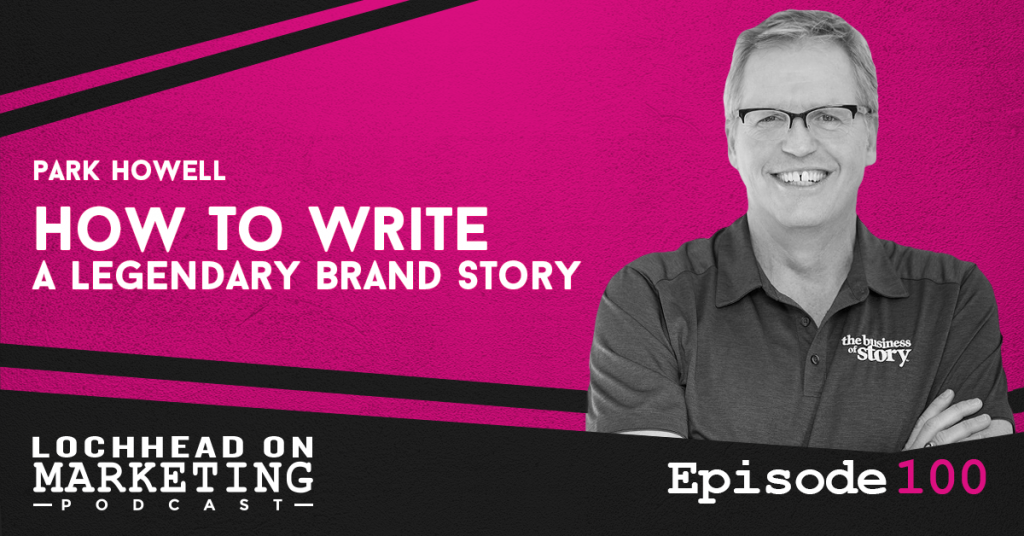
Podcast (lochheadonmarketing): Play in new window | Download (Duration: 40:07 — 27.5MB) | Embed
Subscribe: Apple Podcasts | Spotify | RSS | More
Stories are incredibly powerful. It is legendary. People fall in love based on the stories they tell themselves about each other. People go to war and start countries over stories. Furthermore, when stories are used to design a category and a brand, it creates massive enduring value.
In this episode of Lochhead on Marketing, we talk to the guru of the business of story himself, Park Howell, to educate us on how to construct legendary marketing stories and how story marketing and category design actually come together. Park also shares his fantastic thoughts on nursery rhymes and the Gettysburg address.
What Marketers Get Wrong About Storytelling
Most marketers are not award-winning screenwriters, they’re not great at long-form content like in Hollywood and Pixar. Park discusses how marketing comes down to just three words, one framework that is built on: and, but, and therefore (ABT). This perfect three-act structure is a complete customer framework that will allow the connection to the customer on an empathetic level and help develop the contrast in their problems.
“I’ve learned that this framework hooks the subconscious of your audience, which is always looking for this fight or flight. It’s a problem-solution dynamic that you are playing to the natural way your audience’s brain creates meaning. Now what a lot of people do is they start with the problem in the ‘and’ statement. Start with the aspiration, what is it that your customer wants and then insert the problem in your ‘but’ statement. Therefore, here’s my solution on how to help you get that. And the trick here is to have as much contrast between that aspiration and that problem as possible. A short, succinct, and specific contrast. If you do that, your audience will give you all the time you need in your therefore solution.” – Park Howell
How to End Up with A Captivating Story
Park encourages everyone to start in the middle through the ‘but’ statement and then proceed to answer the singular problem that needs to be solved. Once the singular problem is determined and boiled down, then jump to the ‘and’ statement, the specific audience, and lastly the ‘therefore statement’. Following the ABT framework can lead to amazing and captivating brand and founder stories.
He discusses that when somebody articulates the customer’s problem powerfully and effectively, the human brain makes the assumption that the person by definition must have the solution.
“A good story can kill a bad product quicker than anything. If you’ve got a great founder story, well told that has nothing to do with the product or offering, you create a disconnect there. There are a ton of those stories out there that have gone untold, and they are like gold sitting below your feet. You just have to unearth them and tell them well, but it has to tie to your why it is you do and what you do in your business. Huge believer in that.” – Park Howell
How Story Marketing and Category Design Unite
Christopher and Park discuss how to create legendary stories in context to the use of category design. Park comments one can do this by getting the ABT super focused so nobody can share the same ABT. Along with a little shadow on the category design, this little algorithm tool can help separate and differentiate from the competitors.
Park also discusses how the Gettysburg address and nursery rhymes all used ABT in their brilliant storytelling.
“If you go to the Gettysburg address, you’ll see the Gettysburg address is a perfect and, but, therefore. Lincoln steps on stage and addresses the GRA crowd. Exactly two minutes, 272 words. Yet it’s one of the most iconic, legendary leader addresses of all time. If you look at it, it’s set up in a perfect and, but, and therefore for him to give. He was just a brilliant storyteller. He knew the power of contradiction and consequence, and that’s what he was delivering that day. If you look at any nursery rhymer, most 90% of all nursery rhymes are an ABT.” – Park Howell
To know more about Park Howell and how to construct legendary marketing stories, download and listen to this episode.
Bio:
Park Howell is a 30+ year veteran of the advertising industry who has guided hundreds of purpose-driven brands and thousands of people who support them to substantial growth.
But everything changed in 2006. That’s when he realized the advertising paradigm was being disrupted by the internet. Brands used to own the influence of mass media, but the masses had become the media creating a cacophony of communication.
Park learned that an anecdote is the antidote to help you stand out.
He now consults, teaches, coaches, and speaks internationally helping leaders and communicators rise above the noise of the Attention Economy and be heard using the power of the brand and business storytelling.
Many so-called storytelling experts tell you why story is important in business. Park actually shows you how to storytell.
Audiences are bewitched by his interactive keynotes, panel discussions and workshops.
Links:
We hope you enjoyed this episode of Lochhead on Marketing™! Christopher loves hearing from his listeners. Feel free to email him, connect on Facebook, Twitter, Instagram and subscribe on iTunes! You may also subscribe to his newsletter, The Difference, for some amazing content.
***
Following an exercise out of Lochhead’s playbook (we’re always on the lookout for new ways to make our Story Cycle system more powerful for brands that choose to leverage it), we arrived at the ideal market category design for their new product.
Here is the script we created to design their new category:
How many times do you breathe each day?
About 20,000 inhales and exhales.
And that’s not always easy if you suffer from airborne allergens.
Some 50 million Americans do.
75% of which still rely on over-the-counter medications.
But they don’t realize that these drugs are often ineffective and…
could be making them even sicker.
WebMD lists 34 side effects to common allergy meds, including dry mouth, drowsiness, itching, irritability and nightmares.
But they don’t mention what other studies have found.
That prescription and OTC allergy drugs can lead to cognitive impairment.
Including a lowered IQ and potential increases in dementia and Alzheimers.
When it comes to understanding the true impacts of allergy meds, Americans are suffering from a severe case of…
…Mental mucus.
UNTIL NOW!
Introducing Airloom™ for “Conscious Allergy Relief”
Airloom™ is the smartest, all-natural support for allergy season, with the most potent herbal supplement formulation designed for people mindful toward their mind and body.
It’s small-batch, fresh allergy relief centered on clearing the air about the environmental and big pharma impacts of allergy season on you.
So you can…
Inhale a healthy dose of life again.

